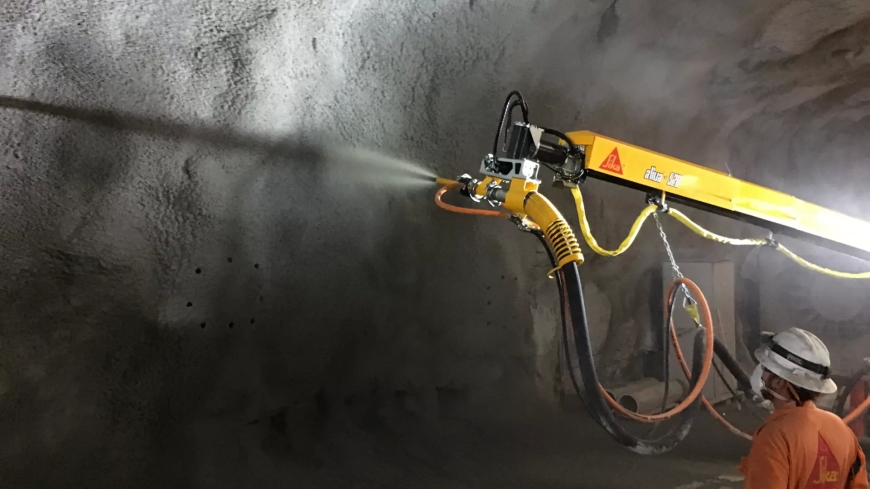Shotcrete Concrete and Tunnel Safety: Essential Solutions for Modern Infrastructure
In this article, we’ll explore how shotcrete concrete is essential for tunnel projects and how it enhances tunnel safety.

With the continuous development of infrastructure, tunnels play a critical role in transportation and utilities. However, constructing safe and durable tunnels requires advanced materials like shotcrete concrete. Shotcrete not only provides immediate support during construction but also contributes to long-term safety. In this article, we’ll explore how shotcrete concrete is essential for tunnel projects and how it enhances tunnel safety.
What is Shotcrete Concrete?
Shotcrete concrete is a specialized form of concrete that is applied by spraying it at high velocity onto surfaces. Unlike conventional concrete that is poured into molds, shotcrete is pneumatically projected, allowing it to adhere to various shapes and structures seamlessly.
Types of Shotcrete
-
Dry-Mix Shotcrete: In this method, the dry ingredients are mixed first and water is added at the nozzle during spraying.
-
Wet-Mix Shotcrete: Here, the concrete is pre-mixed with water before being pumped through the sprayer. This method offers better consistency and reduces rebound.
The Role of Shotcrete in Tunnel Construction
Shotcrete is used extensively in tunnel construction to provide primary support and stabilization during excavation. It adheres directly to rock surfaces, preventing debris from falling and strengthening the tunnel walls. It also acts as a sealant, reducing water ingress and improving overall durability.
Advantages of Using Shotcrete in Tunnels
-
Fast Application: It can be sprayed quickly onto surfaces, speeding up construction timelines.
-
High Durability: Shotcrete is resistant to cracking and can withstand extreme pressure.
-
Flexible Application: Ideal for curved and irregular surfaces commonly found in tunnels.
Tunnel Safety: An Essential Priority
Tunnel safety present various hazards, including collapses, water leakage, and fires. Ensuring the stability and safety of tunnels requires robust materials and construction practices. Additionally, ventilation is crucial to maintain air quality and prevent accidents.
How Shotcrete Enhances Tunnel Safety
-
Immediate Support: Shotcrete hardens quickly, providing instant stability to freshly excavated areas.
-
Rockfall Prevention: It binds loose rocks and prevents them from falling inside the tunnel.
-
Fire Resistance: Shotcrete contains properties that enhance fire safety, offering vital protection during emergencies.
Applications of Shotcrete in Tunnel Projects
-
Transportation Tunnels: Used in rail and road tunnels to maintain structural integrity.
-
Water Tunnels: Prevents leakage in hydroelectric and drainage tunnels.
-
Mining Tunnels: Provides essential support in underground mining operations.
Challenges in Using Shotcrete
Applying shotcrete effectively requires favorable environmental conditions. Extreme temperatures or humidity can impact its performance. Additionally, skilled labor is required to ensure proper application and thickness.
Innovations in Shotcrete Technology
-
Robotic Spraying Systems: These systems automate the shotcrete application process, improving precision.
-
Fiber-Reinforced Shotcrete: Incorporating fibers enhances tensile strength and reduces cracking.
Shotcrete Equipment for Tunnel Construction
-
Mincreter Machine: A versatile machine used to spray shotcrete efficiently in confined spaces.
-
Shotcrete Pumps: Ensure continuous flow for smooth application.
Standards and Guidelines for Tunnel Safety
Adhering to industry standards ensures shotcrete quality and tunnel safety. International guidelines also govern tunnel construction to prevent accidents and enhance durability.
Best Practices for Applying Shotcrete in Tunnels
-
Surface Preparation: Ensure the surface is clean and moist before applying shotcrete.
-
Consistent Thickness: Maintain uniform application to prevent weak points.
Case Studies: Successful Use of Shotcrete in Tunnels
Many tunnel projects worldwide, such as the Gotthard Base Tunnel in Switzerland, have utilized shotcrete to enhance safety and durability. The material’s adaptability and strength have made it a preferred choice for large-scale projects.
Conclusion
Shotcrete concrete is an indispensable material in modern tunnel construction. Its ability to provide immediate support and long-term durability makes it crucial for tunnel safety. Whether used for transportation, mining, or water tunnels, shotcrete ensures stability while mitigating risks. Investing in quality shotcrete solutions is essential for building safe and reliable infrastructure.
FAQs
1. How long does shotcrete take to cure?
Shotcrete typically takes 24 to 72 hours to cure, but full strength is achieved after 28 days.
2. Can shotcrete be used for underwater tunnels?
Yes, specially formulated shotcrete can be applied in underwater conditions to prevent leaks.
3. What is the lifespan of shotcrete in tunnels?
Shotcrete can last 50 years or more with proper maintenance.
4. How does shotcrete improve fire safety in tunnels?
It contains fire-resistant additives, limiting damage during tunnel fires.
5. Is shotcrete environmentally friendly?
Yes, modern shotcrete formulas use eco-friendly materials and reduce waste through efficient application.
What's Your Reaction?




















